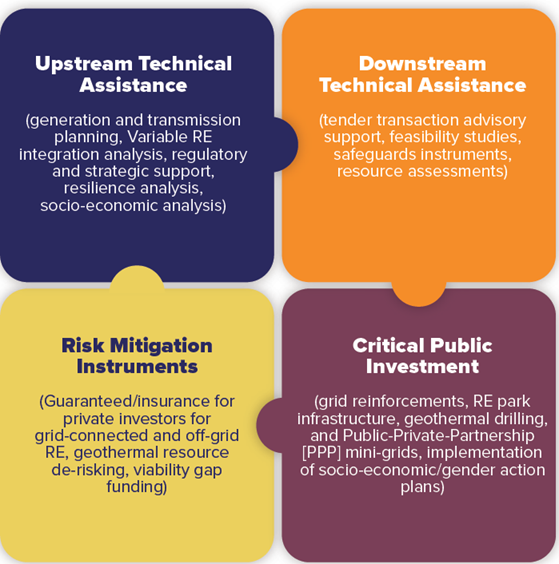Enabling Governments and the Private Sector to Harness Wind and Solar Energy in Developing Countries
Launched in 2018, the Sustainable Renewables Risk Mitigation Initiative (SRMI) is a partnership of the World Bank’s Energy Sector Management Assistance Program (ESMAP), the Agence Française de Développement (AFD), the International Renewable Energy Agency (IRENA), the International Solar Alliance (ISA) and Sustainable Energy for All (SE4all). In 2023, the Asian Development Bank (ADB), the European Bank for Reconstruction and Development (EBRD), the African Development Bank (AfDB) and the Deutsche Gesellschaft für Internationale Zusammenarbeit (GIZ) via the GET.transform program joined the Partnership.
SRMI’s objective is to support countries build a pipeline of bankable renewable energy projects leveraging private investment while maximizing socio-economic benefits. To unlock this pipeline, the Partners developed a comprehensive methodology from the government’s perspective. The methodology includes a series of important steps to deflate the critical risks perceived by the private sector while minimizing the cost for the public sector.
SRMI leverages the expertise of its different Partners to provide:
- Upstream technical assistance focusing on creating an enabling environment through generation planning, variable renewable energy (VRE) integration and setting the appropriate regulatory framework,
- Downstream technical assistance to support the procurement of private investors (funding transaction advisors, feasibility studies etc.),
- Targeted funding for public investments in battery storage and grid reinforcement, and
- Innovative risk mitigation instruments to cover the residual risks perceived by private investors.
Through this support, SRMI is helping countries create, finance, and execute renewable energy programs that mobilize private investments. SRMI has assisted 52 countries in every region of the world in generating a substantial 6 gigawatts of renewable energy. By enabling reliable and affordable electricity, SRMI has provided 21 million people access to modern electricity.
 |
Our Work
In March 2021, the Green Climate Fund (GCF) Board approved a US$280 million funding for SRMI Facility to be hosted by the World Bank. This Program was designed to help unlock US$3.3 billion in private investments needed to complement the limited public funding available. It supports seven countries: Botswana, Central African Republic, Democratic Republic of the Congo, Kenya, Mali, Namibia, and Uzbekistan, shifting to low-emission sustainable development pathways and increasing access to affordable, reliable, sustainable and modern energy. The expected main results are 2.5 GW of renewable energy, 1 GWh of battery storage and 4.2 million people provided with access to reliable electricity.
In March 2023, SRMI-Resilience, the second phase of the SRMI Facility, was approved by the GCF to support the energy transition in nine developing countries: Ethiopia, Guinea-Bissau, Indonesia, Kyrgyzstan, Mongolia, Seychelles, Somalia, Tajikistan and Tunisia. SRMI-Resilience is a US$ 160 million GCF program which will be blended with US$ 960 million in World Bank financing to leverage US$ 1.8 billion in private investments. The main expected results are the deployment of 2.2 GW of new renewable energy projects, 570 MWh of battery storage, and access to electricity for 3.2 million additional people.
The SRMI country projects serve as an example of how developing countries can level market disadvantages and attract private sector financing for cleaner and more sustainable energy sources.